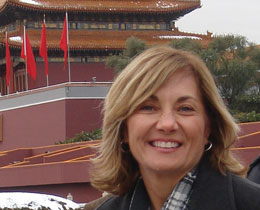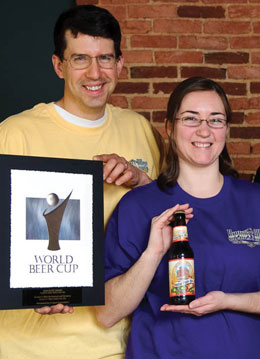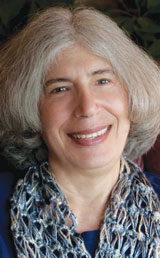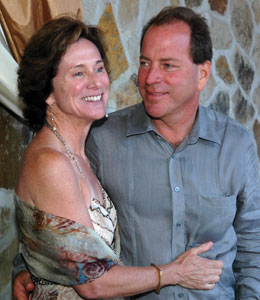Volume 28 · Number 2 · Winter 2011
Alumni Profiles
Erin Ambrose

Erin Ambrose
Occupation: Marriage and family therapist in Roseville, adjunct professor of psychology at William Jessup University in Rocklin and mentor for hundreds of psychology professors in Beijing.
Preventing student suicides in China: Erin Ambrose ’92 was on a business trip with her husband, Tony, in Hong Kong in 2004, when she learned that hundreds of college students in China have committed suicides in recent years — many by jumping off the roofs of their dorms. A pastor asked her to help his staff counsel young church members at risk. She later contacted the head of the psychology department at Capital Normal University in Beijing, who told her that the students feel intense pressure to succeed from their parents and society. “They are terrified to fail a test,” Ambrose said. Psychology professors there are responsible for counseling distressed students, but have received little or no clinical training and are left with only a textbook to guide them, she added. To give them more tools, Ambrose teamed up with two San Francisco Bay Area psychologists to launch a series of pro bono workshops beginning in November 2009 for professors from universities around Beijing. Ambrose and her colleagues used interactive practices and role-playing to teach the professors “how to sit with someone in their pain, be a listening ear and allow them to fall apart.” Psychology is a relatively new science in China, Ambrose said. As a result, the professors have focused on finding a quick solution, rather than digging down to the roots of the problem. After making four trips to Beijing, Ambrose is impressed with the feedback. “One woman told me on my last trip that I was the most important person in her life.” Ambrose has since been asked to offer the same services in Shanghai and Singapore.
Inspired by others: Like many Californians, Ambrose was engrossed in the 1980s Southern California McMartin preschool case, in which McMartin family members were accused of molesting hundreds of children at their day care center. Although the case was controversial and ended years later with all charges dropped, Ambrose said she was intrigued by the potential impact a psychologist could have on a family. She left her job as a manager of a clothing store, went back to school to get her bachelor’s and master’s degrees in psychology, and has since been working with families and children of all ages in her Roseville office. “I can’t imagine doing any other job; I love it.”
Self-therapy: Ambrose waterskis with her husband, runs from six to 26 miles every day and, in October completed the Long Beach Marathon — her 10th marathon — with her 28-year-old daughter, Katie. “Therapy can be pretty emotionally draining, and running is a way for me to burn off my stress and clear my head,” she said.
“I can’t imagine doing any other job; I love it.”
Tom Flores and Margaret Lenz

Tom Flores and Margaret Lenz
Occupation: Brewmasters at Brewer’s Alley in Frederick, Md.
Milestone: Brewing beer has been a hobby of Tom Flores, M.S. ’97, since high school, but he didn’t see it as a possible job until his senior year at the University of Maryland when his friend told him about the graduate brewing program at UC Davis. It was the only brewing program he applied to. “It was all or nothing,” Flores said. “If I didn’t get accepted, it meant I wasn’t supposed to be a brewer. The day I got the acceptance letter, it was a milestone in my life.” He has been the head brewmaster at Brewer’s Alley for more than 13 years, and has created over 50 different types of beer — including one made for his and his wife, Carolyn’s, wedding in 1999.
Aggie additions: Colleague Margaret “Maggie” Lenz ’08, who works as the promotions director as well as a brewer, joined Brewer’s Alley after graduating with a degree in food science, with an emphasis in brewing. Lenz said she always knew she wanted to go into food science, but never thought about making beer until she got to Davis. “When I transferred to Davis, I spoke with an adviser, and I had to pick an area of study. Brewing looked like fun, so I thought, ‘Why the heck not?’” Lenz, who studied under brewing Professor Charles Bamforth, now thrives in the brewing industry, which is heavily male-dominated. She said she enjoys showing young women they can do whatever they want. “Everyone’s so surprised to see a female brewing, and it’s nice to show people that it isn’t a man’s world,” she said. “Women were the original brewers. . . . When it got bigger, it became a ‘man’s job.’”
Flores also hired Todd Perkins in 2010 after Perkins earned a brewing certificate from the UC Davis Extension brewing program in 2008.
A firm foundation: In 2009, the city of St. Mary’s commissioned Brewer’s Alley to make a beer for Maryland’s 375th birthday celebration — “1634 Ale.” It contained only ingredients that would have been found during the early colonial period in Maryland, which required digging into history, science and art. Flores said his personal quest in brewing is exploring the different flavors and types of beers he can make, but without the firm brewing foundation he learned from UC Davis Professor Emeritus Michael Lewis, it would have been impossible. “It really takes a lifetime to get to the point where you get the depth of knowledge to consider yourself a master of this craft. Everything I learned still rests on the experience I had [at UC Davis].”
“Everything in my career as a brewer really rests on my time [at UC Davis]. Not only was it a wonderful time in my life that I have fond memories of, but it gave me a firm foundation of learning that I continue advancing.” — Tom Flores
Q&A with Toni Bernhard

Toni Bernhard
Toni Bernhard, J.D. ’82, a former UC Davis law professor and dean of students, fell ill on a 2001 trip to Paris. Doctors diagnosed her as suffering from an acute viral infection. She has never fully recovered from the condition.
A longtime meditator, Bernhard soon discovered that she could no longer engage in sitting meditation — it was too painful due to her disorder. And so, she had to learn new ways to deal with the profound change in her life. Drawing on this, she recently wrote How to Be Sick: A Buddhist-Inspired Guide for the Chronically Ill and their Caregivers (Wisdom Publications, $15.95) while bed-bound — “on my back, laptop on my stomach, notes strewn about on the blanket, printer within arm’s reach,” she says.
A recurring theme is that, though your body may be sick or otherwise disabled, your mind can still be at peace.
Is your life now more satisfying than when you were a law professor?
Yes and no. I’ve developed new interests that I doubt I would have otherwise pursued, such as classical music and opera. And I discovered that I love to write. I’ve slowed down a lot and feel that I appreciate life’s little happenings more — birds outside my bedroom window, the sound of rain on the roof. But I can’t say that it ever feels satisfying to be sick. I also miss spending time with the faculty and staff at King Hall and I miss teaching and mentoring students. King Hall had become my second home.
How difficult is it to end an old life and begin a new one?
Extremely difficult! It’s so hard. I continued to work part time at the law school for one and a half years after falling ill, even though I was too sick to do so. That just illustrates how difficult it is to accept that the life you thought you’d be living for another 15 or 20 years is simply not going to turn out as you planned. I didn’t begin to accept my new life until I’d been sick for almost five years.
What inspires you most about Buddhism?
What inspires me most about Buddhism is that the Buddha never claimed to be anything other than an ordinary human being. This means that the equanimity and joy that we see in the many images of him is within the reach of every one of us.
How does art enrich your life?
To a large extent, art has replaced my social life. The classical music of Mozart, Beethoven, Schubert and Schumann lifts me above the aches and pains in my body. All four of them suffered from debilitating chronic illnesses or conditions yet composed music of such depth and beauty and complexity.
What is your next project?
I don’t know. I’m always working on the “project” of trying to regain my health. But I’ve learned from disappointment after disappointment that there’s no magic pill that can make me better. I’ve thought about writing another book but I’m too sick to do any kind of formal research. So, what’s next for me is a mystery. And I’m OK with that.
Vintage Aggies: Fred and Nancy Cline, owners, Cline Cellars

Fred and Nancy Cline
Fred Cline ’79 always wanted to be a farmer, but he didn’t set out to tend vineyards.
As a teenager, Cline spent summers working on his grandparents’ ranch in the Contra Costa County community of Oakley. His experiences there made an enormous impact on him. “Once I started to get that agricultural influence,” he says, “I was hooked.”
When he eventually transferred to UC Davis from community college, Cline had a GPA above 4.0 and a scholarship.
Nancy (Bunting) Cline ’79 was raised in Ross in Marin County and also chose UC Davis for its agricultural programs. On campus she met members of Alpha Gamma Rho, the college agricultural fraternity.
“My life changed,” Nancy says. “I made a number of friends, and from that time on my college experience completely opened up.” Among her new fraternity friends was Fred. They have been married nearly 25 years and have seven children.
After graduating from UC Davis with a degree in agricultural management, Fred found work helping landowners clear old orchards to prepare the ground for other crops. On one job in Oakley, he came across a piece of land with an old winery that had sat idle for more than 30 years.
Fred, already a home winemaker for some time, secured a lease on the property, and in 1982, Cline Cellars was born.
Seven years later, the Clines bought a 350-acre spread in the Carneros region of Sonoma and relocated the winery, complete with new vineyards and facilities. The new Cline Cellars tasting room opened its doors in 1991.
Since then, Fred’s innovative practices have produced many distinctive and highly acclaimed wines. In 2004, Wine Spectator named Cline Cellars one of the “50 Great Producers Every Wine Lover Should Know.”
Today, Fred and Nancy continue to be pioneers in the industry, not only because of the grapes they plant and the wines they produce, but also because of their farming practices. They’ve given up chemical pesticides and have begun to re-mineralize the soil.
Today, the Clines have two wineries, Cline Cellars and Jacuzzi Family Winery, which opened directly across the street from Cline Cellars in 2007.
This year, the Vintage Aggies Wine Club selected Cline Cellars’ 2008 Cashmere as its annual Legends Release. The Cashmere is a blend of the Mourvèdre, Grenache and Syrah varietals. “It’s luxurious and smooth,” Nancy says. It’s also charitable. For every bottle of Cashmere sold, a donation is made to the Breast Cancer Network of Strength fundraising bike event, Ride to Empower (ride.networkofstrength.org).
Back to Alumni: A Pattern of Generosity
